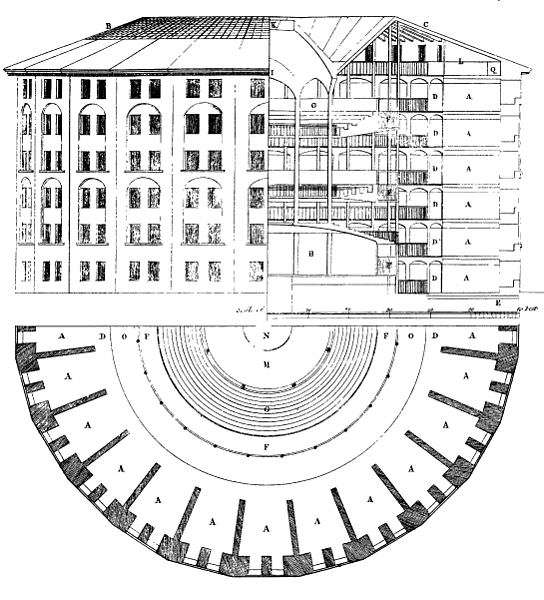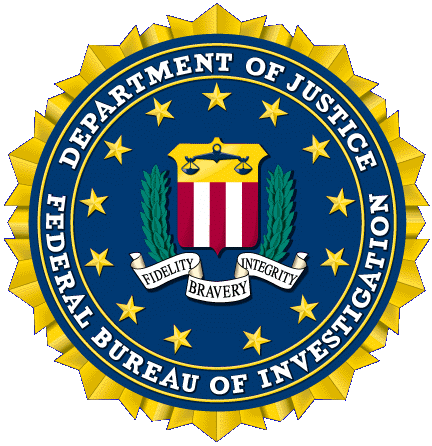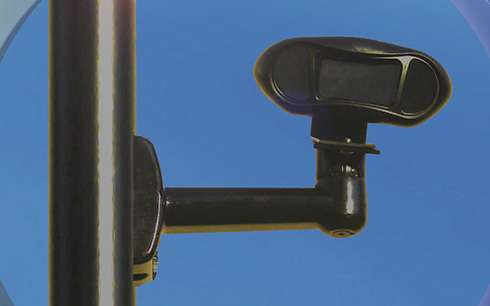The Surveillance State Isn't Coming—It's Already Here
The national Panopticon is a messy work in progress, but it's already in place.

For weeks, headlines have trumpeted revelations about the National Security Agency's tracking of Internet traffic and phone communications and the secretive rubber-stamp court intended to provide us some illusion that our privacy and civil liberties are being respected, but which approves virtually every domestic spy scheme it reviews. It's almost… almost like we live in a surveillance state, we stammer as we blink at the brave new world revealed around us. But there's no "almost" about it; from the CIA spying through local cops, to FBI snooping through driver's license databases, to police departments tracking your movements with license-plate scanners, the NSA is only one part of the growing, unfinished, but very real surveillance state that the United States has become.
If intention automatically manifested itself in the real world, we'd already be living in the Panopticon. There's little doubt that many government officials lust after scrutiny and control. Sen. Lindsey Graham (R-The Bunker) famously told reporters, "If I thought censoring the mail was necessary, I would suggest it." Graham's soulmate, Sen. Dianne Feinstein (D-Deeper in the Bunker), joined other lawmakers in calling Edward Snowden's revelations about NSA snooping "treason." And, even as the NSA revelations unfolded, FBI Director Robert Mueller complained to the Senate Judiciary Committee that "there is a growing gap between law enforcement's legal authority to conduct electronic surveillance, and its ability to conduct such surveillance" and asked for enhancements to the Bureau's already vast snooping capabilities—just two years after the FBI unilaterally revised its Domestic Investigations and Operation Guide to loosen restraints on intelligence-gathering.
Among the FBI's most powerful surveillance tools have been national security letters, which act as subpoenas forcing disclosure of private data, but with a gag order attached forbidding the recipient from revealing that they've been forced to cough up information. Since third parties, like Google or phone companies, are the usual recipients of NSLs, the actual targets are effectively denied a chance to appeal. Such recourse-free data-perusing was recently declared unconstitutional by a federal judge in California, but that's not the end of the legal battle—and recipients are still being forced to comply.

Even if NSLs go the way of the (extremely nosy) dodo, the FBI has plenty of other eavesdropping tools. the Communications Assistance for Law Enforcement Act gives the Bureau such easy access to telecommunications systems that phone companies must tailor their technology for easy wiretapping. Now, the FBI wants to extend that authority to Internet companies. In fact, federal officials refer to comunications that aren't easily wiretapped as "the Going Dark problem," to be addressed by new resources and powers.
While the FBI knows what you're saying, and to whom, it also can find out where you're saying it. Through the use of stingray devices which masquerade as cell phone towers, the feds can get your own mobile devices to reveal your location. The feds have been a little lax about asking judicial permission for using the widgets, too, often disguising them as much less intrusive older technology. Local police departments, not surprisingly, emulate federal practice.
Oh, and that crappy photo of you on your driver's license? That's been digitized, stored and, in 26 states, it's being used as a mugshot to compare to surveillance camera pics of suspected criminals, terrorists, or people some cop finds really cute. The software behind that photo matching almost certainly comes from the FBI's Next Generation Identification facial recognition technology. The Bureau intends to create a national database.
That the FBI plays the role of Uncle Creepy probably isn't a shocker—if anybody is going to do it, it's going to be J. Edgar's old outfit, right? And now that we know the NSA spies directly on Americans, it's no revelation to learn that the FBI fields cases handed off by both the NSA and CIA. It's one big government, after all. Just because intelligence agencies aren't supposed to operate domestically doesn't mean they can't find somebody to do it for them. That is, if they don't just go ahead and do it themselves anyway, because "the Fourth Amendment does not apply" to gathering phone records, as Deputy Attorney General James Cole told Congress.
Among the other bodies that acts as a proxy for a CIA that can't legally conduct domestic operations is the New York City Police Department. With a retired CIA officer appointed deputy director of the NYPD Intelligence Division after the 9/11 attack, and other spooks seconded to the department, the NYPD was off to the races, spying on targets with a special emphasis on Muslims who complained about discrimination, including those outside its jurisdiction, without generating a single lead.
The CIA connection may explain why the Justice Department never got around to conducting a promised investigation of the NYPD's spying, though the CIA's own Office of the Inspector General voiced concerns about the relationship's potential for "negative public perception" and "the risk that CIA officers could become involved in law enforcement matters."
Not that the NYPD needs federal help to be intrusive. Stop-and-frisk policies aside, the department has rolled out portable terahertz scanners that can "see" metal objects through clothing, like guns, knives, expensive watches, or recording gear that you may use to monitor the cops in a case of turnabout is fair play. New York City Police Commissioner Ray Kelly isn't the type to fret over the peeping tom nature of such technology, having announced after the Boston Marathon bombing, "I think the privacy issue has really been taken off the table." He referred, specifically, to the deployment of surveillance cameras to watch comings and goings in public places, but that sentiment is appropriate for so many occasions.

New York City is hardly alone. Municipalities across the country rushed to embrace the all-seeing eye of the video camera after the bombing, despite warnings that there may be some downsides to a national Panopticon. Oregon is even repurposing existing traffic cameras for surveillance use.
Traffic cameras are also being further enhanced and deployed to capture and automatically identify license plates as they pass by. License-plate scanners have been set up along Interstate highways in the southwestern states by the DEA, ostensibly to detect patterns that might indicate drug trafficking—though they also record the movements of everybody else who travels along those roads. Local police departments in northern California are connecting their databases of captured license plates to track and store people's movements far and wide. But private vendors have already created vast systems, such as the National Vehicle Location Service, that police departments can plug into with minimal fuss.
Oh, and in Maryland, among other jurisdictions, you can get audio with that video, as recording devices on public buses now capture all conversations in transit.
Feeling faint? Maybe a little paranoid? Well, you might want to think twice before sharing that information with your doctor. As the Affordable Care Act—Obamacare—is implemented, patient information is centralized in a "Data Services Hub" in order to determine Americans' privileges and exemptions in using the health care exchanges established under the new law. Data will be shared with federal agencies, state agencies, agency contractors, consultants, CMS grantees, and non-profit entities operating exchanges for states, all "without the consent of the individual to whom such information pertains," according to an obscure regulatory notice. So far, the centralized information includes "personal, employment, financial, demographic, and pregnancy status and tobacco use," but not actual medical records. Even assuming the data collection and sharing stops there, isn't that enough?
And a final note — if you needed anything more to chew over — is that the NSA's perusal of telephone records is echoed by the Postal Service's photographing and recording the outside of every piece of mail it transmits. You won't keep your pen pals secret by going old school.
There's no obvious grand plan here to strip privacy from Americans and allow government scrutiny of every detail of American life. But fear of terrorism, fear of crime, and promises of more efficiently allocated services have combined together to create exactly what many of us feared: the surveillance state. It's not fully formed, it's ever-evolving in a direction that's likely to surprise even its creators, and it's parts aren't all on speaking terms, but it's here.


Show Comments (29)